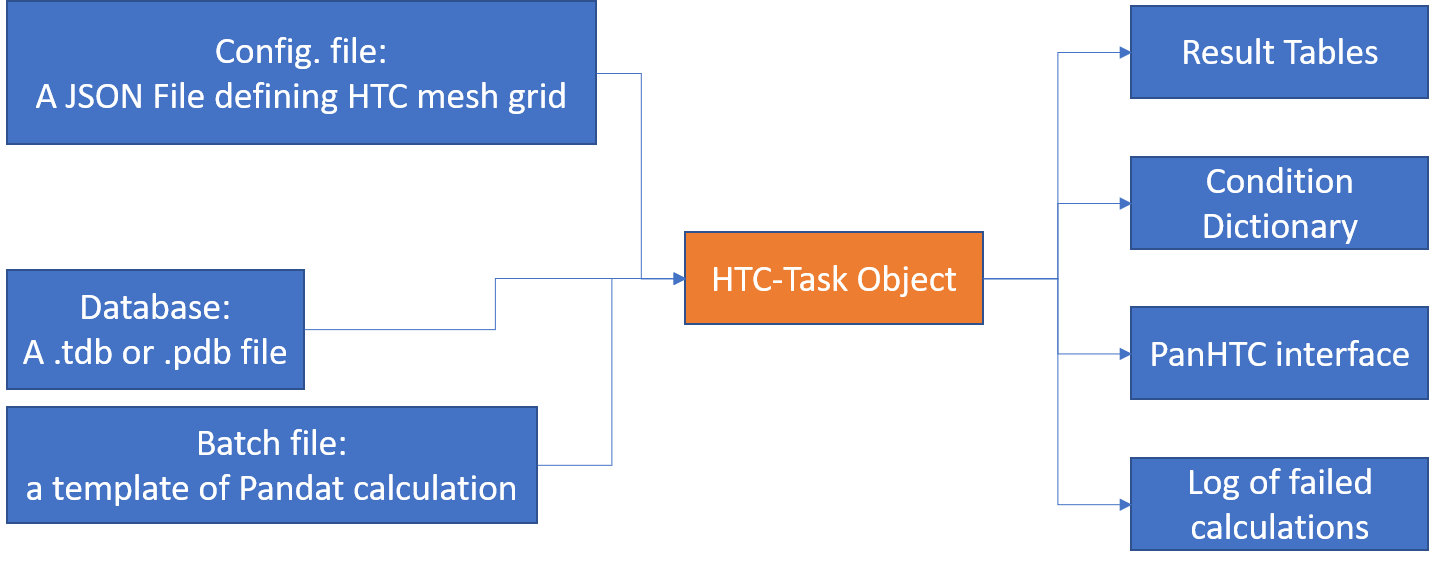Parallel High-Throughput Point Calculation (HTC)¶
This example demonstrates how to use PanPython SDK to perform Parallel HTC for several batches of points concurrently.
Post-processing and visualization of the HTC results will be discussed in Post-Processing of data from Point HTC.
About point HTC¶
Point HTC allows a user to perform calculations for numerous compositions and/or temperatures in the user-defined state space by a simple setting. Alloy compositions and/or temperatures that satisfy user-defined criteria can then be discovered through data mining of the simulated results.
Step-by-step guide¶
Note
A video guide will be available very soon.
- Open the demo folder
“/Solution Examples/parallel_htc_points/” from PyCharm IDE. See Installation to setup the IDE environment.
- Build a task script
An example script parallel_htc_points.py has already been include. Following the steps the create your script:
- Import packages
import os import socket import multiprocessing as mp from panpython.system import System from panpython.task.htc import HtcMesh import pickle
- Setup Pandat.exe path:
pandat = "YOUR_PATH_TO_PANDAT_EXE/Pandat.exe"
- Setup working folders and input files:
dir_name = os.path.abspath(__file__) file_name = os.path.basename(__file__) task_path = dir_name[:-len(file_name)] dump_path = os.path.join(task_path, "output") batch_file = os.path.join(task_path, "resource", "Point_AlMgSi_400C.pbfx") config_file = os.path.join(task_path, "resource", "Input_point.JSON")
Note
The calculation type is set in Input_point.json:
{ "Type": "point", }
The calculation type in the batch file template must be consistent with this type, or an exception will be raised:
<calculation name="Point Calculation_Point_Al-Mg-Si_400C" type="point">
Note
The tdb file is set in the batch file template Point_AlMgSi_400C.pbfx:
<databases> <database type="tdb" file_name="AlMgSi.tdb"/> </databases>
- Set thread(s) number:
################# # set thread number # note: if your number is bigger than system capability, the number will set to max # available thread number on your system thread_number: int = 4 print('>> Max thread number on machine: ', socket.gethostname(), ' is ', mp.cpu_count()) if thread_number > mp.cpu_count(): thread_number = mp.cpu_count() print('>> Thread number is set to ', thread_number)
- Initialize the HTC task instance:
################# m_system = System(pandat=pandat, dump_path=dump_path) ################## m_system.add_task(task_definition=HtcMesh(batch_file=batch_file, config_file=config_file, thread_num=thread_number))
- Run HTC task instance in multi-thread mode:
################## if __name__ == '__main__': mp.freeze_support() # required to run multi-thread m_system.run()
- Run the script
After the HTC is finished, tables and generated tables/files are ready to use. See Inputs and outputs of this HTC task for details.
Inputs and outputs of this HTC task¶
The following figure displays inputs and outputs of this HTC task.
- File structure
The follow diagram displays the file structure used by this HTC task:
parallel_htc_points
|- output # outputs
| |- intermediate
| | |- *.dat # Result Tables in csv format
| | └─ *.table # Result Tables
| |
| |- failed_calculation.json # Record of failed calculations
| |- PanHTC_interface.txt # Pandat HTC Alloy Table
| └─ task_id.txt # Condition Dictionary
└─ resource # inputs
|- AlMgSi.tdb # Database to be used by HTC calculation
|- Input_point.json # A Config. file (JSON) defining an HTC mesh grid
└─ Point_AlMgSi_400C.pbfx # A template of batch file used calculation
- Inputs
The input files are under /resource folder.
Configuration file of point HTC: A JSON file defining an HTC mesh grid. The file name is /resource/Input_point.json.
Database: A .tdb or .pdb file to be used by HTC calculation. The file name is /resource/*.tdb or /resource/*.pdb.
Batch file: A template of batch file used for Pandat calculations in HTC. The file name is /resource/*.pbfx.
- Outputs
The output files are under /output folder.
Result Tables: The original tables from Pandat. The tables are stored under /output/intermediate/ folder.
Record of HTC conditions: A JSON-styled dictionary containing all calculation conditions of HTC. The file name is output/task_id.txt.
Pandat HTC Alloy Table: This file can be imported by Pandat GUI to perform an HTC calculation with the identical condition. The file name is output/PanHTC_interface.txt.
Failed Calculations: a record of failed calculations. The file name is output/failed_calculation.txt.
Configuration file of point HTC¶
One of the input files. The file name is /resource/Input_point.json.
A JSON file defining an HTC mesh grid. An example of Config. file as an input to HTC:
{
"Type": "point",
"Units": {
"n": "x%",
"T": "C"
},
"T": {
"start": 400,
"end": 400,
"step size": 0
},
"Al": {
"start": 0,
"end": 100,
"step size": -1
},
"Mg": {
"start": 10,
"end": 50,
"step size": 10
},
"Si": {
"start": 10,
"end": 50,
"step size": 10
}
}
The keys of the JSON file is defined in the following table:
Key
Definition
Type
Calculation type of Pandat
Units
Units following Pandat’s convention
T
Temperature grid
Al
Aluminum composition grid
Mg
Magnesium composition grid
Si
Silicon composition grid
The properties of each key’s value is defined in the following table:
Property
Definition
start
start value of a grid
end
end value of a grid
step size
step size of grid; If its key is an element and set -1, its key is the balance element
Record of HTC conditions¶
One of the output files. The file name is output/task_id.txt.
A JSON-styled dictionary containing all calculation conditions of HTC. An example of Condition Dictionary as an output from HTC:
{
"0": {
"T": 400,
"Al": 80.0,
"Mg": 10,
"Si": 10
},
"1": {
"T": 400,
"Al": 70.0,
"Mg": 10,
"Si": 20
},
"2": {
"T": 400,
"Al": 60.0,
"Mg": 10,
"Si": 30
}
}
Keys of the JSON file is the id of a calculation. Properties of the calculation include all the keys from Config. file.
- Pandat HTC Alloy Table
This is one of the output files. The file name is output/PanHTC_interface.txt. This file can be imported by Pandat GUI to perform an HTC calculation with the identical condition.
See Generate an Table of Alloy Compositions for HTC in Pandat GUI for the details and instructions on the usage of this interface.
